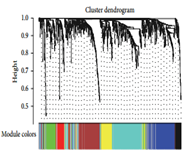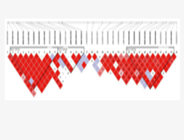The increasing importance of meat quality has implications for animal breeding programs. Research has revealed much about the genetic background of pigs, and many studies have revealed the importance of various genetic factors. Since meat quality is a complex trait which is affected by many factors, consideration of the overall phenotype is very useful to study meat quality. For integrating the phenotypes, we used principle component analysis (PCA). The significant SNPs refer to results of the GRAMMAR method against PC1, PC2 and PC3 of 14 meat quality traits of 181 Duroc pigs. The Genome-wide association study (GWAS) found 26 potential SNPs affecting various meat quality traits. The loci identified are located in or near 23 genes. The SNPs associated with meat quality are in or near five genes (ANK1, BMP6, SHH, PIP4K2A, and FOXN2) and have been reported previously. Twenty-five of the significant SNPs also located in meat quality-related QTL regions, these result supported the QTL effect indirectly. Each single gene typically affects multiple traits. Therefore, it is a useful approach to use integrated traits for the various traits at the same time. This innovative approach using integrated traits could be applied on other GWAS of complex-traits including meat-quality, and the results will contribute to improving meat-quality of pork.
The increasing importance of meat quality has implications for animal breeding programs. Research has revealed much about the genetic background of pigs, and many studies have revealed the importance of various genetic factors. Since meat quality is a complex trait which is affected by many factors, consideration of the overall phenotype is very useful to...
The increasing importance of meat quality has implications for animal breeding programs. Research has revealed much about the genetic background of pigs, and many studies have revealed the importance of various genetic factors. Since meat quality is a complex trait which is affected by many factors, consideration of the overall phenotype is very useful to study meat quality. For integrating the phenotypes, we used principle component analysis (PCA). The significant SNPs refer to results of the GRAMMAR method against PC1, PC2 and PC3 of 14 meat quality traits of 181 Duroc pigs. The Genome-wide association study (GWAS) found 26 potential SNPs affecting various meat quality traits. The loci identified are located in or near 23 genes. The SNPs associated with meat quality are in or near five genes (ANK1, BMP6, SHH, PIP4K2A, and FOXN2) and have been reported previously. Twenty-five of the significant SNPs also located in meat quality-related QTL regions, these result supported the QTL effect indirectly. Each single gene typically affects multiple traits. Therefore, it is a useful approach to use integrated traits for the various traits at the same time. This innovative approach using integrated traits could be applied on other GWAS of complex-traits including meat-quality, and the results will contribute to improving meat-quality of pork.



